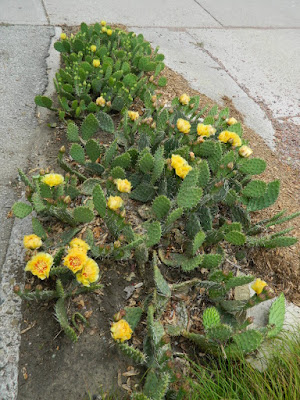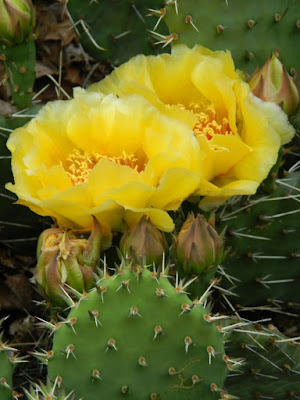Thorn in My Side/Finger: Eastern Prickly Pear
While this native cactus won't exactly reach out and punch you, if you work around it, you'll need to treat it with (very thick) kid gloves.
I have a somewhat love-hate relationship with these impressive clumps of Eastern Prickly Pear (Opuntia humifusa) I "look after" for my Riverdale, Toronto client, although there's minimal fussing around required for these winter-hardy perennials. As shown below, these clumps are located between two driveways at curbside, in full sun. I never water this area and the plants thrive on my neglect. Excellent soil drainage due to the area's sandy soil helps, of course.
Finally, over the past five years working for this client, I've never noticed even once of "evidence" left by cats and dogs. The spines and barbs usually deter our four-legged friends from depositing gifts at curbside!
The flowers are exquisite when they bloom in June. The wax-like yellow petals and orange-red centers practically glow when the flowers fully open during periods of full sun. The reddish fruits developing later are edible and one can make jellies and candies out of them.
So, what's to hate? The reasons are found very noticeably on the cactus's flattened stems or "paddles": a multitude of spines and the more irritating tiny brown barbed bristles which make working around them quite tricky. I can attest that the bristles are a real pain to remove so wearing thick padded gloves is highly recommended when weeding in and around the paddles.
The flowers are favoured by many pollinators like this green fly below.
If you're looking for a perennial that's as "low maintenance" as you can go for a xeriscape or rock garden, Opuntia could be your answer. Consider planting a few Eastern Prickly Pears next spring: just pick up some thick leather gloves while you're at it. You'll thank me later!
Finally, over the past five years working for this client, I've never noticed even once of "evidence" left by cats and dogs. The spines and barbs usually deter our four-legged friends from depositing gifts at curbside!
 |
| Eastern Prickly Pear (Opuntia humifusa) in a Toronto Riverdale Ecological Garden |
The flowers are exquisite when they bloom in June. The wax-like yellow petals and orange-red centers practically glow when the flowers fully open during periods of full sun. The reddish fruits developing later are edible and one can make jellies and candies out of them.
 |
| Riverdale Ecological Garden Eastern Prickly Pear (Opuntia humifusa) flowers |
 |
| Opuntia humifusa (Eastern Prickly Pear) in a Toronto Riverdale Ecological Garden |
So, what's to hate? The reasons are found very noticeably on the cactus's flattened stems or "paddles": a multitude of spines and the more irritating tiny brown barbed bristles which make working around them quite tricky. I can attest that the bristles are a real pain to remove so wearing thick padded gloves is highly recommended when weeding in and around the paddles.
 |
| Toronto Riverdale Ecological Garden Eastern Prickly Pear (Opuntia humifusa) blooms |
The flowers are favoured by many pollinators like this green fly below.
If you're looking for a perennial that's as "low maintenance" as you can go for a xeriscape or rock garden, Opuntia could be your answer. Consider planting a few Eastern Prickly Pears next spring: just pick up some thick leather gloves while you're at it. You'll thank me later!

No comments:
Post a Comment